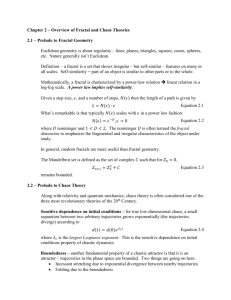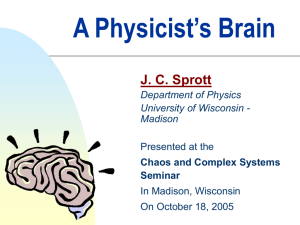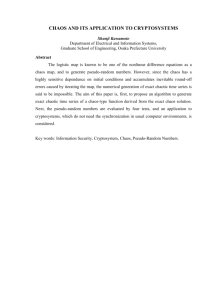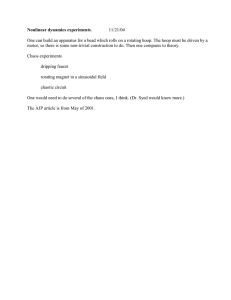ABC of dynamics, populations and weather, ship capsize
advertisement
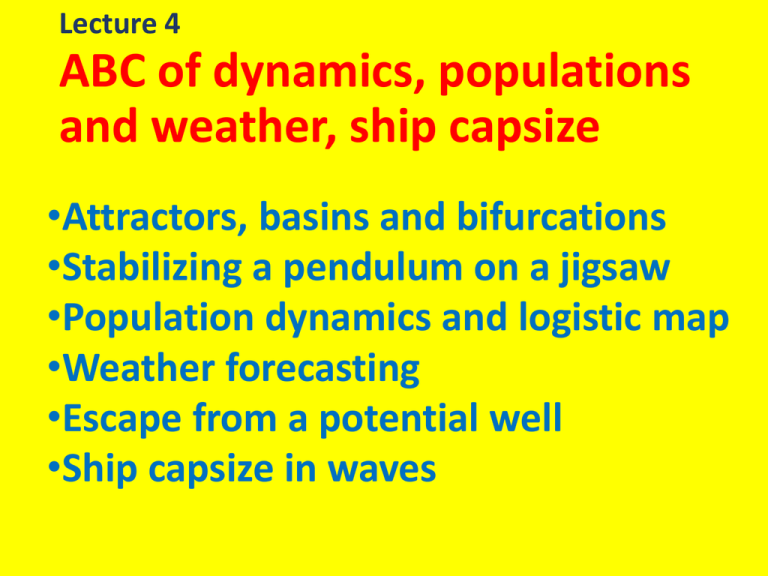
Lecture 4 ABC of dynamics, populations and weather, ship capsize •Attractors, basins and bifurcations •Stabilizing a pendulum on a jigsaw •Population dynamics and logistic map •Weather forecasting •Escape from a potential well •Ship capsize in waves ABC of Nonlinear Dynamics Key concepts of dissipative dynamics are: Attractor, Basin, Catastrophe (bifurcation) BASINS OF ATTRACTION When you have a bath, take a good look at the soap bubbles. Imagine you are looking at a 3D phase space. Each bubble is a basin of attraction At its centre is an attractor A given system can have many attractors of different types, each sitting in its own basin of attraction. The attractor chosen depends on the starting conditions. Chaos theory brought us the new ‘FRACTAL BASIN’ m14 jig m29 lv coex Two bifurcations of an equilibrium path. Chaos gives a lot of new bifurcations. Exp strut The answer! Population Growth In ecology we use discrete time for yearly steps between breeding seasons. The more mayflies in a pond, the more offspring we expect next year. A population that increases by a fixed ratio each year will explode! Applied to humans this result alarmed Thomas Malthus. His Principle of Population (1798) influenced Darwin’s thoughts on natural selection. Simple Growth with an Abundance of Food A discrete dynamical system (called a map) Suppose a population, x, increases by a ratio a each year The rule (map) is then New x = a x Let us start with x = 12 (million, say) and take a = 2 The population in successive years is then 12 ... 24 ... 48 ... 96 ... It increases exponentially to infinity! Had we chosen a value of a = 0.5 (less than one) the population decreases towards zero as 12 ... 6 ... 3 ... Bacterial growth under microscope m36 BacGrow Chaos in Logistic Map New x = a x (1 – x) x is fraction of the maximum population An improved model of population growth. The (1 - x) recognises a constraint of limited food. One-time President of the Royal Society, Lord Robert May, published a paper in Nature (1976). This showed sensitive to initial conditions ... THE BUTTERFLY EFFECT !!! Cascade to Chaos in Log. Map s09 log bif Steady states plotted, x(a) Feigenbaum cascade leads to chaos Cascades in cascades Patterns shrink indefinitely s08 log 45 Moral of the Logistic Map Simple systems can have very complex behaviour. This should be taught in schools!! Unfortunately text books concentrate on solvable problems, usually linear (small amplitude) ones Why did it take 300 years from Newton to chaos? (1) There were no computers or video displays (2) Researchers were looking for order (3) Random results were thought to be wrong: so they ended up in the waste paper basket Lorenz’s Butterfly The flap of a butterfly’s wings in Brazil can set off a tornado in Texas This is a parable about sensitive dependence on initial conditions A tiny difference is amplified until two outcomes are totally different Due to inevitable chaos, long term weather forecasting is impossible m38 twister Met Office now uses multiple runs from different starts For want of a nail the shoe was lost. For want of a shoe the horse was lost. For want of a horse the rider was lost. For want of a rider the battle was lost. For want of a battle the kingdom was lost. And all for the want of a horseshoe nail. (Proverb, 14th Century) Parable of Chaos Capsize in beam seas m02 frig Fractal Basin Erosion • As the driving increases, fractal fingers created by homoclinic tangling make a sudden incursion into the safe basin: integrity is lost • Colours show escape time, measured in driving periods • Simulation (made by Prof Joseph Cusumano) • m13 cusu Next lecture ... improve your sport!


